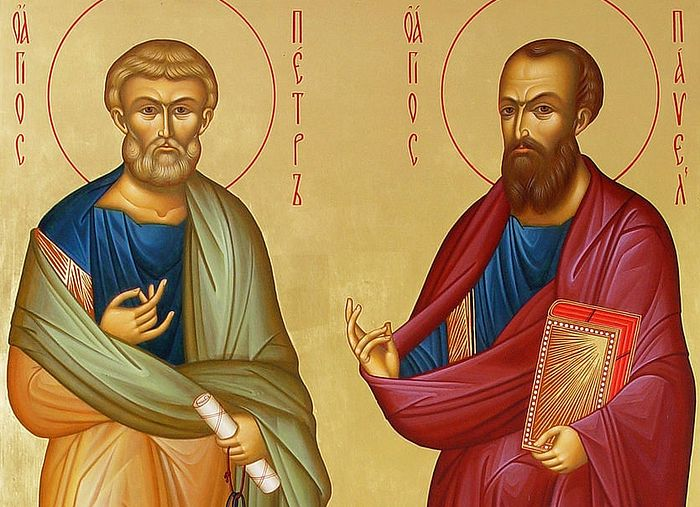Homily on the Feast of the Immaculate Heart of Mary
Today, we celebrate the Feast of the Immaculate Heart of Mary. It was originally established by Pope Pius XII in 1944 to be celebrated annually on August 22. But in 1969, Pope Paul VI moved the celebration to the Saturday after the Solemnity of the Sacred Heart of Jesus. It is an offshoot, a development of the Dogma of the Immaculate Conception of the Blessed Mother Mary. If Mother Mary was immaculately conceived, if by the special grace of God she was exempted from the stain of Original Sin, then she must be Immaculate Heart. Yesterday, we celebrated the Feast of the Sacred Heart of Jesus. By sacred, we mean “connected with God.” The Sacred Heart is a symbol of God’s love, particularly his merciful love for humanity.
On this day, we venerate the Heart of Mary in a similar way we adore the Sacred Heart of Jesus. It is important to note that we are not looking at a specific organ, the biological heart of Mary; rather, we are looking at her purity and love. We are looking at what she loves, just as in the Sacred Heart of Jesus, we fix our attention on what our Blessed Lord loves in his sacred humanity. Just as the Sacred Heart represents the whole person of Jesus Christ, so also the Immaculate Heart represents the entire person of Mary. Symbolically, the Immaculate Heart represents what Mary loves.
In the sixth Beatitude, Jesus said, “Blessed are the clean of heart, for they shall see God.” Now, what does it mean to have a clean heart? It is to be a single-hearted person! According to the great Danish philosopher and theologian, Soren Kierkegaard, “The saint is someone whose life is about one thing,” centered on God. Although you are involved with all sorts of things, you are very active, but all of it is centered around one thing— God alone. That one thing is the anchor of your entire life, around which your whole life revolves. If you are so busy, very active, you are spread all over the map, people may admire you, they may think you are a hard worker, that you accomplish a lot, but if there is no anchor, if there is no one thing that gathers all you do in your life, you will lose your way.
To have a clean heart is to have a heart that is completely free from disordered attachment. Yes, we are created beings. As such, it is very easy for us to have an excessive attachment to created and material things. And when this happens, we become unclean. Our hearts become dirty and occupied. Now, we are not Platonists or Puritans. I have said it multiple times that the Catholic Church rejects puritanism in all its forms. In the Bible, Genesis 1:31, we hear, “God looked at everything he had made, and found it very good.” We do not advocate a flight from the goods of this world. We are meant to enjoy the world that God has made. We believe the world is created good. In our tradition, nature reflects the glory, power, and awesomeness of God. So, the world is good. But our heart does not belong to anything in this world. We believe we live in a world of good things, but nothing in this world can finally satisfy the deepest longing of the human heart. The core and deepest principle of our life must belong to God alone. A clean heart is completely free of these attachments. A clean heart loves created and material things only to the extent that God wants us to love them.
Now, we say that the Heart of Mary is Immaculate, which means absolutely clean. There are degrees of cleanliness. Something can be clean, but not absolutely clean. Anyone who is in the state of grace has a clean heart. A saintly monk can be said to have a much cleaner heart than an average lay person who is out there in the world trying to make a living. But the one who has an Immaculate Heart, one that is absolutely free of any attachment whatsoever, is our Blessed Lady. Why? Because she never had the effects of Original Sin. She was immaculately conceived. She was never guilty of Original Sin. And she did not have the tendency to sin. For the rest of us, no matter how much we mortify our hearts, no matter how much we resist temptation, and this is true even of great Saints, there remains that tendency, that attachment of the heart toward material things. Every single day, we are beset by the temptation to one thing or another because of the effects of Original Sin. And this will happen to everyone, even if you achieved a very high degree of sanctity. But the Blessed Mother did not have that tendency to sin because she was untouched by Original Sin. Her heart was not even drawn to those things. It is Immaculate. So, her heart loves God alone. And her heart loves her neighbor in God. That is why the Blessed Mother Mary is the Greatest Woman, the Greatest Created human being ever. After the Blessed Trinity, the next person in the hierarchy in heaven is Her. This is why we go to her with our problems and with our requests. She has the perfect love of God and the perfect love of neighbor.
Fr. Marcel








